Professor Jairam Reddy reflects on an exceptional life dedicated to dental education and leadership
JOURNEY
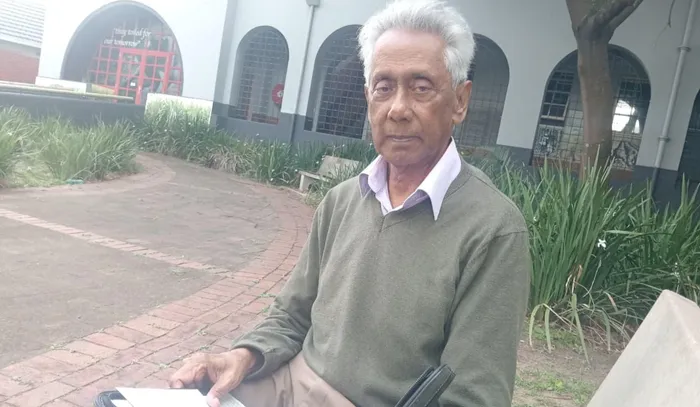
Retired Professor Jairam Reddy, serves as the chairperson of the 1860 Heritage Centre’s History Society.
Image: Nadia Khan
As the country is set to commemorate the 165th anniversary of the arrival of indentured Indians on November 16, POST reporter, NADIA KHAN, spoke to 88- year-old retired Professor Jairam Reddy, a distinguished figure in both the dental and higher education fields. He shared his journey as the son of an indentured labourer to achieving his own success over the years.
AS A YOUNG man with only a dream of achieving success and his father’s blessings, retired Professor Jairam Reddy embarked on a three-week voyage from South Africa to the United Kingdom in pursuit of becoming a dentist.
This would lead the 88-year-old of Musgrave to achieving greater success than he expected, as he later held positions, including as a senior lecturer, dean, and vice-chancellor at universities in South Africa.
In addition, he played a pivotal role in teaching young people from around the world on how to become leaders.
He shared his journey which started from humble beginnings.
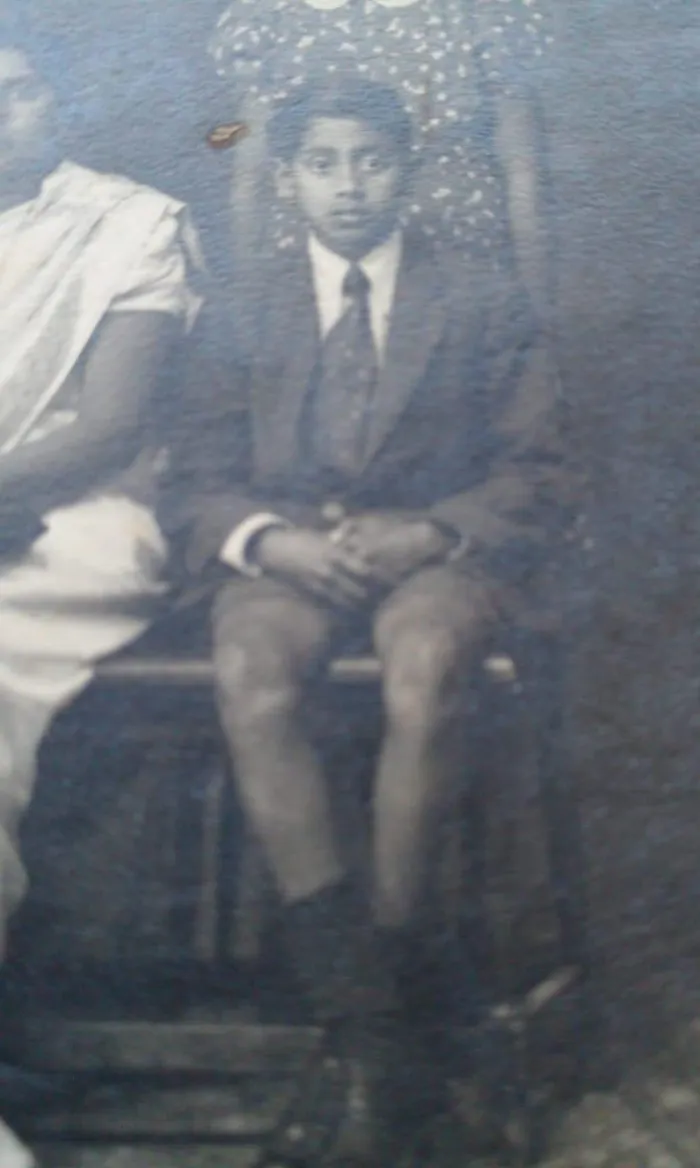
Reddy as a young boy.
Image: Supplied
Childhood
Reddy, who is the ninth-born of 11 children, lived in Roosfontein, Westville, before his family moved to Wyebank.
His father, Chengal Reddy, and grandmother, Chinnaka, who hailed from Chittoor in Andhra Pradesh came to South Africa in 1907.
“My father was about nine-years-old when he and his mother came to South Africa. He initially worked on a sugar cane plantation on the South Coast. He and my grandmother later moved to the North Coast where he worked as a garden assistant for the Campbell family. They were a prominent family in the sugar cane industry.
“I remember my father told us that he earned about 50 shillings and would save his money. When he was about 20-years-old he married my mother, Perumalamma, and that soon after my grandmother decided to return to India. He said when she left, he used his savings to lease a plot of land from a White farmer in Roosfontein.
“On the land, he grew ginger and other vegetables, as well as flowers. He also bought a horse-and-cart. He travelled by horse-and-cart to the Indian morning market in Warwick Avenue to sell his produce. He would leave home at about 1am, and reach there by 6am. By 10am everything was sold out and he returned home. He did that for many years,” he said.
Reddy said when he was about four-years-old the family moved to Wyebank.
“We had a banana plantation, as well as various animals such as cows from which we got milk. My dad became quite the industrial farmer and at the time of his death in 1963, he owned more than 300-acres of land.
“However, as a child I spent my days playing outside. It was quite fun as I had many siblings, and there were many children in the community as there were about 40 other farmers in the area. We often spent our time playing cricket or football, or with the animals,” he said.
Education
Reddy said at age six, he started Class one (Grade 1) at Fannin Government-Aided Indian School.
“The school was built by Indian farmers with the help of the government. It was a small school, with just four classrooms, four teachers and a principal. There must have been at least 100 children. However, I enjoyed my days going to school. I was a good soccer player and our team won many tournaments.”
Reddy said after completing his Standard six (Grade 8), he attended Sastri College and completed his matric in 1956.
“I was quite active. I played cricket and soccer, and was part of the debate team. I also enjoy studying, even though we had the basic facilities, we had exceptional teachers and principal, Dr AD Lazarus.”
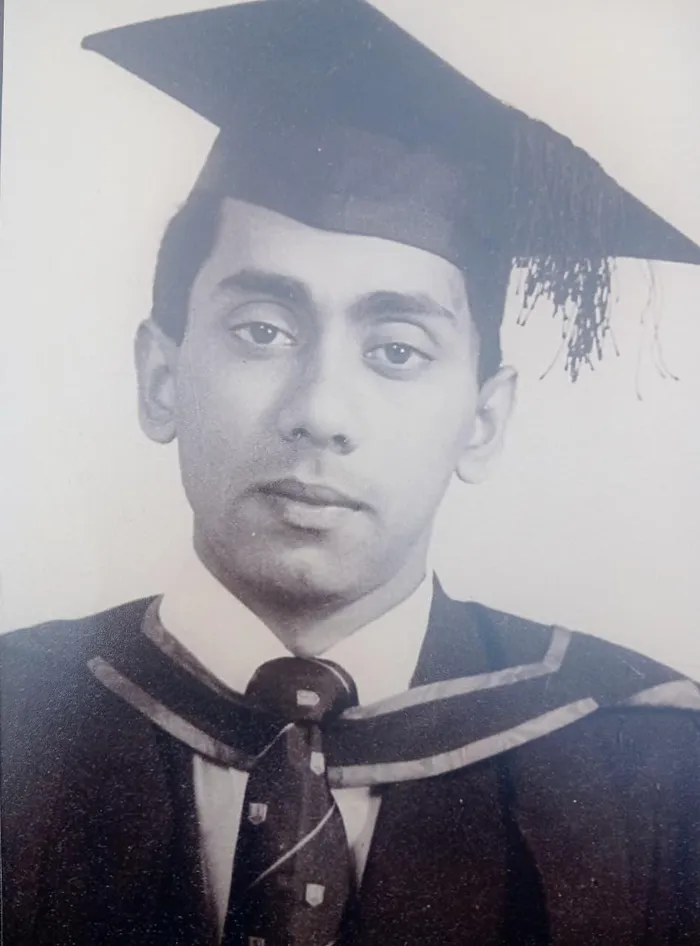
Reddy graduated with his Bachelor of Dental Surgery at the University of Birmingham in England in 1964.
Image: Supplied
Further studies
Reddy said his father encouraged him to go abroad to study dentistry.
“At the time, our further study options were limited due to restrictions under the apartheid regime. So, my father’s friend, who was also a farmer in the area, told him that his son was studying dentistry in Glasgow, Scotland, and that he should send me there.
“At the time I wasn’t sure what I wanted to study, so when my father told me about the suggestion I was curious. He also told me that it was a profession and there were very dentists at the time, and it was needed. He said I should go try. However, before I left, I applied to study dentistry at the University of Witwatersrand, and they rejected me stating, ‘it is only for whites’,” he said.
Reddy said he left South Africa by ship in July 1957.
“When I arrived, I applied to a few universities, but they responded that I have not completed my A-Levels, which are internationally recognised academic qualifications and they could not accept me. I decided to attend a technical college where I studied biology, physics and chemistry.
“However, I applied to universities across the United Kingdom, when I got a call from the University of Birmingham to come in for an interview. I remember they asked me why I came to study abroad, and I showed them the rejection letter. I believe that influenced their decision to give me a place.
“They told me I would have to complete my A-Levels at the university for a year, and then start my dentistry studies. However, I completed it at the college, and the following year I started at the university, where I studied for over five years,” he said.
Reddy said after completing his internship at the Royal Dental Hospital at the University of London, he graduated with his Bachelor of Dental Surgery in 1964.
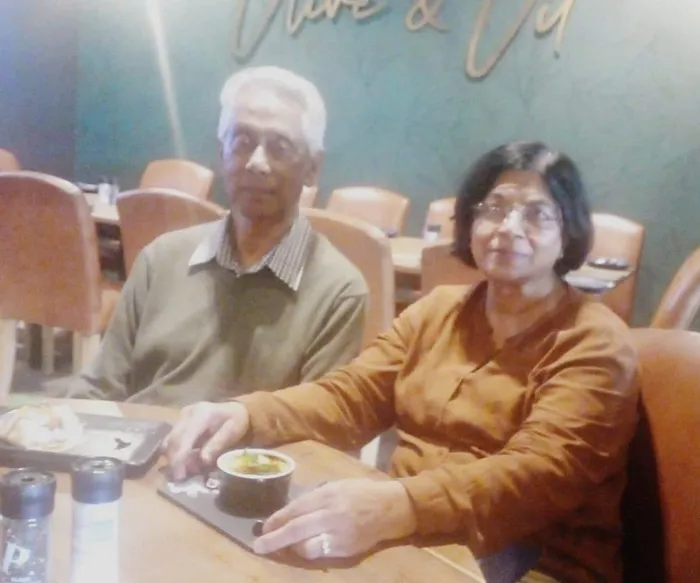
With his wife, Vatha.
Image: Supplied
Career
On returning to South Africa, he opened his own dental surgery in Queen Street, Durban Central in 1965.
“After a few years of practising as a dentist, I decided it was not what I wanted to do for the rest of my life, even though I was living comfortably as my surgery was operating well. I wanted to specialise, so I started applying for scholarships both locally and abroad.
“I again applied to the University of Witwatersrand, and was rejected. However, I was offered a scholarship to study for a Master of Science at the University of Manitoba in Canada. They told me they would pay for it,” he said.
Family
Reddy said in early 1968, the same year he received the scholarship, he was introduced to his wife, Vatha.
“We were introduced by an acquaintance. She also happened to be the daughter of one of my teachers while I was at Sastri College. She had just finished matric. I told her about the scholarship and that I wanted to go, but we should get married, even though we did not know each other that long, we could start our life together and she could study. She agreed. A week after we were married in August that year, we left for Canada. I left a locum dentist to run my surgery.”
The couple have two children, Bashni, 55, a pharmacist, and Naveen, 53, a chartered accountant, who both live abroad. They have four grandchildren.
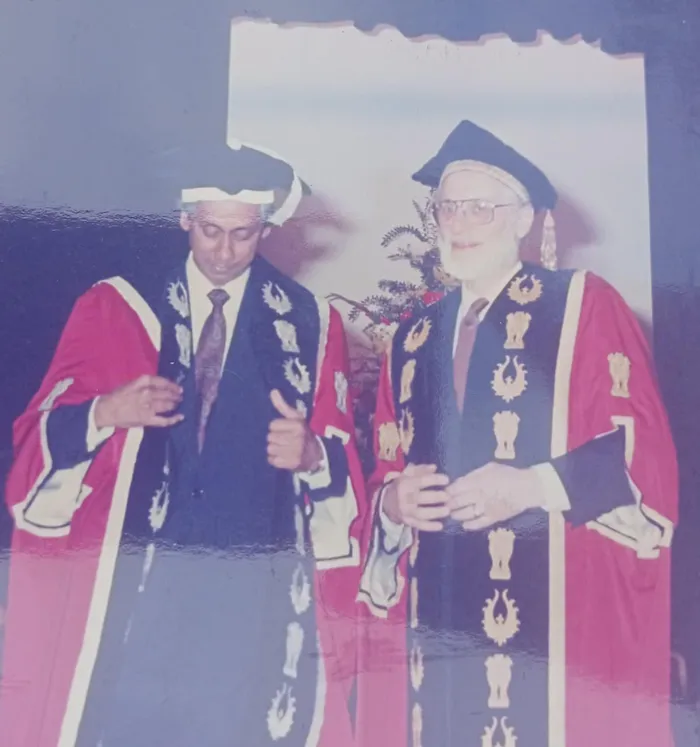
During his inauguration as the vice-chancellor of the then-University of Durban-Westville in 1990.
Image: Supplied
Career abroad
Reddy said while completing his masters degree, he specialised in the discipline of oral medicine and periodontology.
He said during this time, he applied for a job as an assistant professor at the Temple University’s School of Dentistry in Philadelphia, United States in 1971.
“A friend told me about the job opportunity, so I took a chance. I went to the interview and was soon thereafter appointed. I stayed at the university for three years until another opportunity arose for a position as a lecturer at the postgraduate school, Eastman Dental Hospital at the University of London in 1974.
“My family and I relocated after I got the job. While I was lecturing, I completed my Fellowship in Dentistry at the Royal College of Surgeons in Edinburgh.”
Reddy said during this time, he met a fellow South African, practising as a dentist in London.
“He told me there was a dental school at the University of the Western Cape, and that I have all of these qualifications, why don't I go teach there. I told him they would not want me due to the segregation, but he said it was a university for Coloureds, maybe they would offer me a job.
“When I wrote to the university's rector at the time, Professor Richard van der Ross, he told me he was delighted to hear from me. He said they have a dental school and could possibly offer me a job. I returned to South Africa for the interview and within a month they called to say I got the job.
“In 1978, my family returned to South Africa. When I started I was the only Indian lecturer. They were all white. However, I remained determined ,including to climb the ladder. After a few years they advertised for professorship of the department. I became a senior lecturer and later when the dean of the dental school resigned, I was appointed,” he said.
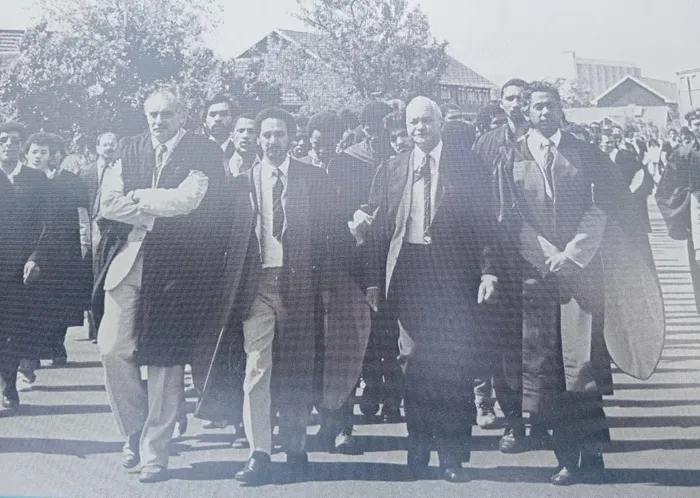
Reddy, while lecturing at the dental school at the University of the Western Cape, far right, with fellow academics and students. They were marching to the police station following the arrest of students who were boycotting in the 1980s.
Image: Supplied
Reddy said while there were challenges, there was also solidarity among the staff and students.
“During this time, there was a lot happening in the country. People, including students, were fighting against the apartheid system. I remember when some of the students were boycotting and were arrested. The staff and students decided to march to the police station and demand their release.
“However, as we were marching, we encountered the police, who pointed their firearms at us. We were told if we take one step forward they would shoot. We had to go back to the university, however, we were able to hand over a petition,” he said.
Reddy said in 1987 he became head of the newly-opened Oral and Dental Hospital of the then-University of Durban-Westville based at King George V Hospital.
In 1989, he applied for the position of vice-chancellor of the university and was appointed the following year.
“It was also during this time that the ANC was unbanned and the late Nelson Mandela was released. The party held their first congress at the university and I got to meet him. I later attended his inauguration as president.”
Reddy served as the university’s vice-chancellor until 1994.
He said however, during this time,the new government advertised its National Commission on Higher Education.
Reddy said he was appointed the chairperson of the commission in January 1995.
“It was an exciting time as there were many transformative changes happening. The commission created a roadmap for transforming the higher education sector. The government said we could no longer have segregated universities and that we need to find a way to bring them together.
“There were 10 people appointed to the commission. After two years we finished our report and handed it to the government on how we can make those changes. That is when we saw the merging of the University of Durban-Westville and the University of Natal,” he said.
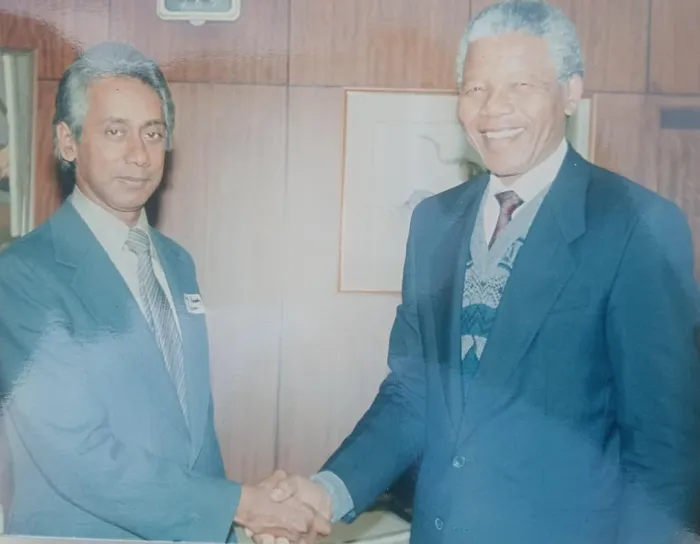
Reddy, who was newly-appointed as the vice-chancellor of the then-University of Durban-Westville, with the late former president Nelson Mandela. The ANC held its first congress at the university following its unbanning in 1990.
Image: Supplied
Retirement
Reddy said in 1997, at age 60, he decided to retire.
However, the following year, he was approached to serve on the council of the United Nations University in Tokyo, Japan.
“The university is the think-tank of the United Nations. They do research on peace, governance, and conflict resolution, among others. They have units such as water research, governance, leadership, and the environment, among others, all around the world.
“The council comprised 25 members from 25 countries from around the world. Their role was to examine what was being done in each of these units and provide advice and guidance. I served as the council chairperson for two years.
“I served on the council until 2004, when I was approached to serve as the director of the United Nations University International Leadership Institute in Amman, Jordan. It was meant to be just for a year but I was there for four years. We trained young people from around the world on how to become leaders.
“At the time, it was very peaceful, so while there my wife and I were able to travel and visit places such as Turkey,Egypt, Syria and many other places around the world,” he said.
He said upon his return to South Africa he also served on the council for the Durban University of Technology. He said during this time he also ran leadership programmes for the students.
Reddy currently serves as the chairperson of the 1860 Heritage Centre’s History Society.
“Over the years I attended various events at the centre, and interacted with Selvan Naidoo, who is the curator and director. He approached me about the idea of starting the History Society, and a small committee was formed together with other members.
“We have various events throughout the year such as academic programmes, book launches, commemorative events such as the anniversary of our indentured forefathers, and celebrations for people who have made a difference in society.”
In addition, Reddy is the chairperson of the Sastri College Alumni Association.
“We use funds raised to provide scholarships and support the school with its various projects. One of the things we have done is raise money to build the hall at the school.”
Reddy also serves as a board member of the African Centre for the Constructive Resolution of Disputes, a member of the senate of the Management College of South Africa, a member of the International Leadership Association and as a trustee of the Denis Hurley Centre.
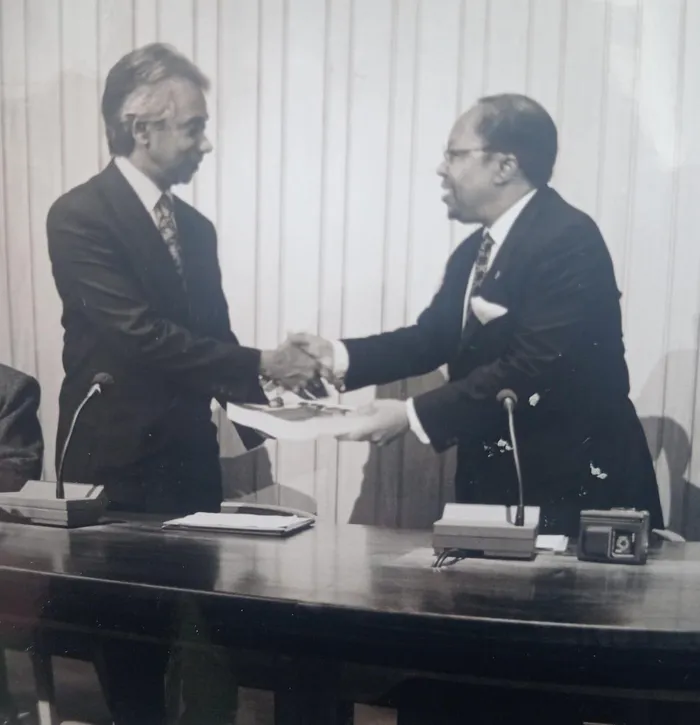
Reddy, who served as the chairperson of the National Commission of Higher Education, hands over a report to the now late Sibusiso Bengu, who was the first post-apartheid Minister of Education.
Image: Supplied
Accolades
Over the years, Reddy has received numerous recognitions including the Paul Harris Fellow from the Rotary Foundation of Rotary International, the Lifetime Achievement Award from the Shotokan Karate International South Africa, and Satayagrah Award from the Gandhi Development Trust.
In addition, he has received honorary doctorates from the University of the Western Cape, the University of Birmingham and Open University, both in the United Kingdom.
Reddy has also lectured widely and is the author of numerous refereed articles published in local and international journals, and has presented over fifty research papers in various congresses.
He said he is was now working on his memoir.
“I often attended family functions, and many funerals at which I speak and share my family’s history. The younger generation are often fascinated by hearing this. It made me think, what happens when I am no longer around, who will share this history?
“There is a saying, ‘if you know your history, you will understand the present, and can look into the future’, therefore I felt it important to document my story, which starts from my father’s journey to my own. I may not be a hero, but I believe it is also good to hear the stories of the ordinary person doing things to better their lives. It will hopefully also serve as an inspiration to the future generation.”
Relaxation
Reddy said he attributed his longevity to taking daily morning walks.
“I don’t have health conditions which I believe is due to taking long walks for the past 25 years. My wife and I walk around our area every morning, and on the Durban beach promenade on Sundays. We also enjoy going to the cinema, playhouse or concerts.”
Related Topics: